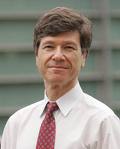Interview with Jeffrey Sachs

Click the audio player to hear my interview (5:30) with the esteemed economist and academic Jeffrey Sachs.
I have the utmost respect for Mr. Sachs and the tireless work he is doing on sustainability and poverty alleviation. I have my doubts, however, about his comments in our interview that we can somehow achieve high living standards for all while also limiting climate change and environmental deterioration. He didn’t go into detail about how this could be achieved and I’m still waiting for an economist to explain this to me. Facing an extremely serious environmental predicament and a population projected to grow to 9 billion by mid-century, we will likely have to think hard about what we mean by “better living conditions for all” as Sachs describes it. Is he talking about western-style living standards for everyone or some other notion of prosperity?
Jeffrey Sachs is director of the Earth Institute at Columbia University. In 2004 and 2005 he was named among the 100 most influential leaders in the world by Time Magazine. He is also Special Advisor to United Nations Secretary-General Ban Ki-moon. From 2002 to 2006, he was Director of the UN Millennium Project and Special Advisor to United Nations Secretary-General Kofi Annan on the Millennium Development Goals, the internationally agreed goals to reduce extreme poverty, disease, and hunger by the year 2015. Sachs is also President and Co-Founder of Millennium Promise Alliance, a nonprofit organization aimed at ending extreme global poverty.
He is widely considered to be the leading international economic advisor of his generation. For more than 20 years Professor Sachs has been in the forefront of the challenges of economic development, poverty alleviation, and enlightened globalization, promoting policies to help all parts of the world to benefit from expanding economic opportunities and wellbeing. He is also one of the leading voices for combining economic development with environmental sustainability, and as Director of the Earth Institute leads large-scale efforts to promote the mitigation of human-induced climate change.